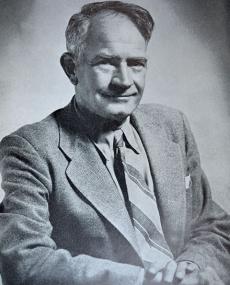
Botanist, founder member of the Young Communist League, member of the CPSA,editor of Umsebenzi, the Communist Party weekly, later a member of the Liberal Party
Edward Roux was born in the northern Transvaal in 1903, the son of an English mother and. an Afrikaner father. He grew up in Johannesburg, where his father opened a pharmacy in 1907. Roux's father was a free-thinker and a convert to socialism, and Roux, while still a student, helped found the Young Communist League in 1921.
In 1923 he joined the CPSA and was drawn into the wing of the party led by Sidney Bunting and then in a minority, which favored emphasis on the recruitment of blacks. After completing an honor's degree at the University of the Witwatersrand, Roux was awarded a fellowship to Cambridge University, where he spent the years 1926-1929 completing a Ph.D. degree and doing research on plant physiology.
In 1928 he went to Moscow as a South African delegate to the sixth congress of the Communist International. It was at this congress that the Communist Party of South Africa (CPSA) was instructed to adopt the "Native Republic" doctrine, and although Roux opposed the slogan his loyalty to the CPSA remained unshaken. He returned to South Africa and by 1930 was engaged on full-time political work as editor of Umsebenzi, the Communist weekly. He remained active until 1935, when the purge of alleged right-wing elements that had overtaken Bunting in 1931 finally caught up with him, and he was removed from the party's political bureau. Isolated and rejected by the party, and feeling guilty about his acquiescence in the expulsion of Bunting, he left the CPSA in 1936 and for the next 20 years took no direct part in politics.
He returned to his scientific career, and after the war joined the faculty of the University of the Witwatersrand, where he became the professor of botany in 1962. In his free time he wrote S. P. Bunting ”” A Political Biography, published in 1944, Time Longer Than Rope, first published in 1948 (and later updated and republished in 1966), and numerous articles and pamphlets. In 1957 he joined the Liberal Party and once again became politically active as he canvassed for its support. Although "named" as a former member of the CPSA in 1950, he was not singled out for persecution by the Nationalist government until the early 1960s.
In 1963 he was forced to resign from the Liberal Party under new rules restricting "named" persons, and in 1964 he was issued a full array of banning orders, prohibiting him from teaching, publishing, attending gatherings, being quoted, or leaving Johannesburg. He died in 1966.
His autobiography, Rebel Pity: The Life of Eddie Roux, written with his wife Winifred, appeared in 1970.